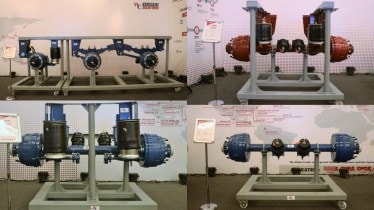Hendrickson, a leading supplier for medium- and heavy-duty commercial vehicle manufacturers, sees new growth opportunities in India on the back of ‘maturity in the CV space’. The company is looking at becoming a key contender in India’s organised trailer supplier industry. This will be a reality once it successfully onboard Ashok Leyland as a client. In fact, barring the Chennai-headquartered CV maker it works with majorly with all OEMs in India.
Speaking to Financial Express Online, Richardo Martin, VP – International Operations, Hendrickson confirmed that, “We are also in discussion with them (Ashok Leyland).”
He was speaking on the sidelines of the event organised to mark the launch of its new range of products – air & mechanical suspensions and axles for trailer applications – in the Indian market on July 25. These products are not only aimed at existing customers, but also expand its coverage in the Indian CV market.
In India, it counts Tata Motors, BharatBenz, Daimler India Commercial Vehicles, VE Commercial Vehicles, Force Motors, Mahindra Defence, Mahindra Truck & Bus and SML Isuzu among its key customers.
India’s importance in Hendrickson’s global play
It was almost 17 years back in 2006, Hendrickson had entered India through a joint venture with Tata AutoComp Systems. In 2011 incorporated a wholly-owned subsidiary Watson & Chalin India to expand its manufacturing footprint for truck, and trailer products, and serve as a manufacturing base to support not only domestic customers but also exports in Europe, Middle East and Asia. The company has invested more than $20 million (Rs 165 crore) in India, excluding the JV.
Through its JV with Tata AutoComp it serves the truck and bus market, and through Watson & Chalin India the trailer segment. In fact, Mathew Joy, President & CEO, Hendrickson shared that at present India’s business accounts for 5 percent of its global revenues. “We are growing our footprint in a rate which is very similar, even while the pie looks bigger, the contribution (read revenue from India) has not grown in percentage as our global markets keep growing. India is very important to us, and that’s why we are here and investing. There are truck makers, trailer makers, customers, and end-users in India, it is important for us to provide value products to them,” added Joy.
Currently, the company can manufacture 30,000 trailer axles and suspensions per annum in India, with a high-capacity utilisation rate. The size is similar to the estimated industry size of trailers in the country of around 30,000-40,000 units per annum.
New opportunities
At present, the company’s ticket price or average content per vehicle ranges anywhere between 30 percent to 50 percent of the trailer cost of a flatbed truck. “It’s a critical component, it impacts the efficiency of the trailer and can determine if the customer makes or looses money,” said Mohit Khosla, Director & CEO, Hendrickson India.
One of the common questions that any automotive industry stakeholder faces is the impact of electrification. For Hendrickson, the move from IC-fuel to any other energy source will not have a direct impact but would provide more opportunities to develop products that are lightweight and offer higher uptime for its customers.
“We are very much aligned with the global CV market. Thankfully, the products we sell today will largely fit those vehicles (read alternate energy). What we see in the future though is the need for performance permits. For example, on the transit bus, the batteries have to go on the ceiling, so the centre of gravity is higher. Our customers are asking for more roll-stable solutions,” explained Martin.
The company is also moving from steel to composite materials, which reduces the weight by half but would add to the cost and premium. “For us it’s less about product changes, but more of small adaptations of what we have today to help them achieve those goals,” he concluded.
